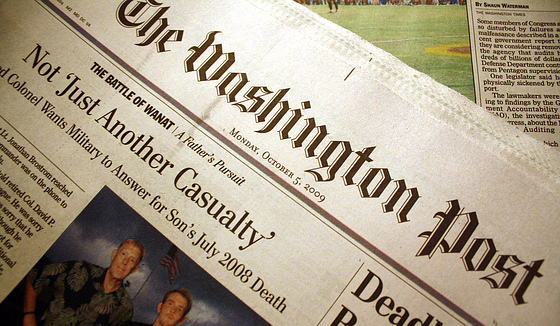
Image by Elvert Barnes on Ipernity. Some rights reserved.
Traditional media must protect quality legacy and not fear online-only players, Washington Post managing editor Raju Narisetti told the World Editors Forum today.
Speaking as part of a panel discussing the business models of multimedia newsrooms compared with solely online publications, Narisetti said while the Post may at times envy online players, he refused to turn his back on the legacy of the newspaper.
"It's an issue of legacy and mindset, the legacy is we all have fairly profitable newspapers to manage in addition to what we do online. We have to embrace the legacy and deal with it, we can't walk away.
"But not all legacy is worth keeping," he added in an interview with Journalism.co.uk. "It is like a household which has a lot of fine china, but may also have a lot of chipped and broken cups and saucers.
"Every once in a while we have to throw out the things that are chipped and broken and use our fine china more. In our case this would be our brand, our credibility and sometimes our breaking news."
He told the conference that the business models of purely online news outlets could not be profitably applied to papers such as the Post.
"It is not like we can just dump what we have been doing and go to the other sustainable purely online model. Online-only players don't have the legacy and have a very different mindset. Their DNA is different. Their speed is not once a day as some of us are used to.
"They don't think of themselves as gatekeepers, more like gate openers. They are much more metrics focused, they give readers as much as they can, sometimes too much. It gets them a lot of eyeballs and they can engage more, but these are different standards. I am happy to be held up to a higher standard."
He said the Post had however embraced the changes, with the combining of print and online operations and the introduction of new roles such as interactivity editors, search editors and engagement editors.
"If we keep social media as a ghetto then we are doomed to fail. We have so-called specialists but it is not their job to post news on social networks, it is their job to advise the newsrooms. If serving social media is seen as someone's job, it will fail. Uses of social media must be deployed through staff."
While he said it can be "embarrassing" when their own stories receive hundreds more comments on other sites than on their own site, he said the paper has a responsibility to his readers to continue to provide a certain standard of content, not just to appeal to search.
"I'm not dismissive of them (Huffington Post), often I am envious. On their site, 1600 people have commented on a post about a Washington Post story, while only 73 people commented on the original story on our site. But we cannot be afraid of them, we have to embrace that kind of innovative approach.
"My competition is not Huffington Post or the Daily Beast, it is one single non-renewable resource of our readers - their time. We have to do everything possible to ensure it is my brand, my journalism that prevails."
He added that while he values page views, it was most important to retain the trusted brand which draws back the Post's readers.
"We have to understand what they (online-only organisations) are doing well and adapt to that but stick to what I do well, it's a balance," he said.
Such adaptations include the Post's recent investment in yet to launch news start-up Ongo Inc, which is understood will be a new paid-for subscription platform providing users with the "reading and sharing of digital news and information from multiple publishers".
But Narisetti told Journalism.co.uk that the Washington Post was not ruling out its own paid-content model.
"The quality of the content we produce needs to be well funded, and one of the ways could be to make users pay for it, not all of it. I am not a big believer of putting everything behind a paywall. I am a big believer in saying we should monetise."
"More power to the New York Times and the Wall Street Journal in figuring out and if they do we would be happy to look at that. We may find our own way," he added.
There will be more on the panel discussion from Journalism.co.uk to follow soon.
More from the World Editors Forum on Journalism.co.uk:
WEF coverage on Journalism.co.uk
WEF coverage on Journalism.co.uk Editor's Blog
Free daily newsletter
If you like our news and feature articles, you can sign up to receive our free daily (Mon-Fri) email newsletter (mobile friendly).
Related articles
- Washington Post releases year-in-review feature for subscribers
- From Reuters to The New York Times, Big Oil pays 'most trusted media brands' to push greenwashing
- News subscriptions hit a snag amid cost-of-living crisis, RISJ report finds
- The Washington Post discovers an engaged gaming audience
- Four digital media trends to watch: generative AI, Gen Z, business models and news formats









